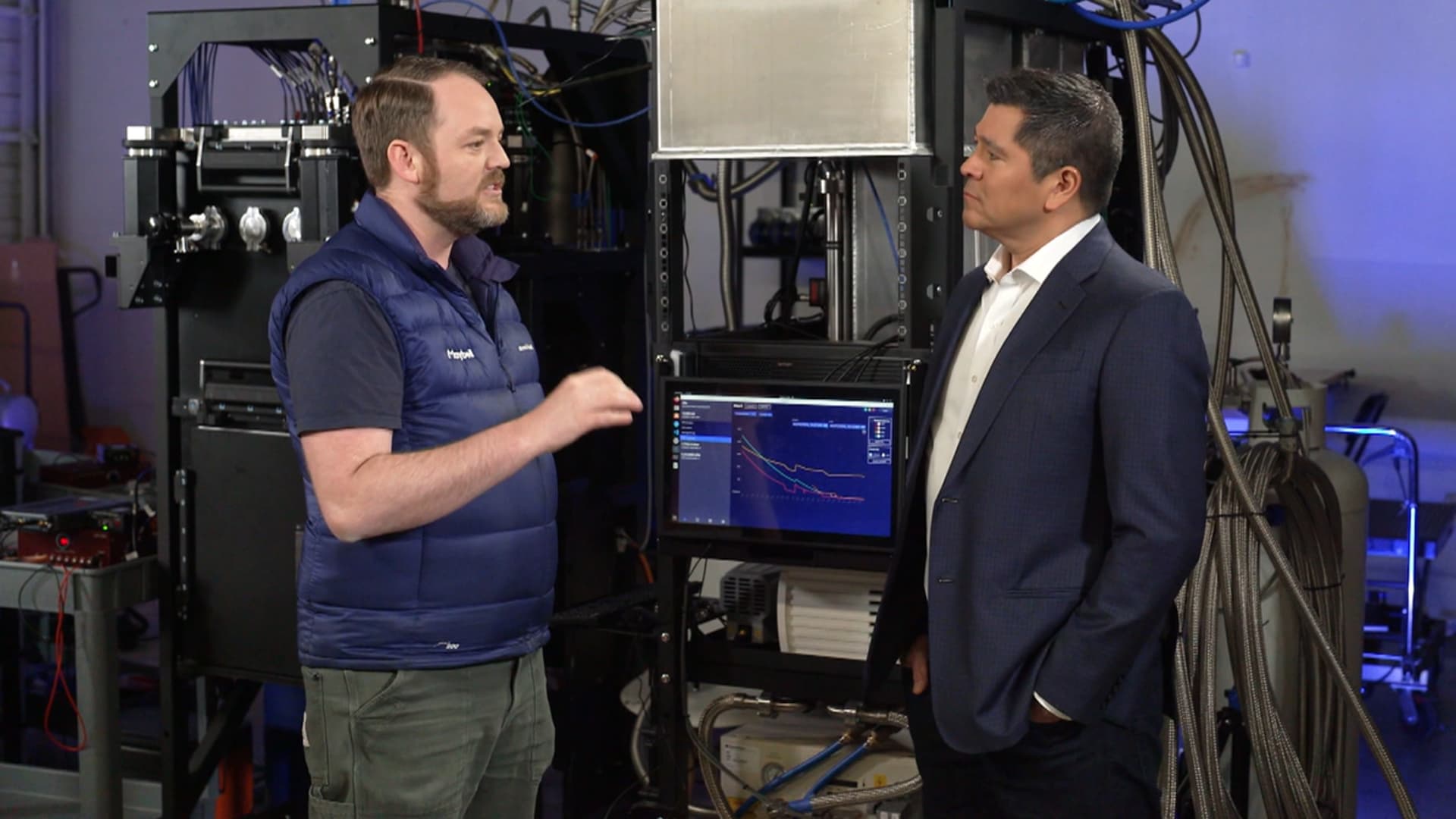An Atom Computing employee engaged in work on a computer screen.
CNBC
This story is part of CNBC’s quarterly Cities of Success series, which explores cities that have transformed into business hubs with an entrepreneurial spirit that has attracted capital, companies and employees.
Imagine a world where computers solve problems billions of times faster than today’s machines can, ushering in a new era of scientific discovery.
That’s the promise of quantum technology — and a fierce race is underway to unlock its potential. In the shadow of the Rocky Mountains, the Denver-Boulder region is emerging as a global leader in this revolution.
Atom Computing is based in the San Francisco area, but CEO Rob Hays told CNBC in a recent interview why his quantum company chose the city of Boulder for its new $100 million facility: the region’s thriving ecosystem.
“The future looks really bright for us here. … We’ve built two of the largest quantum computers on the planet,” Hays said in CNBC’s primetime special “Cities of Success: Denver & Boulder,” which airs April 11 at 10 p.m. ET. “The fact that we’ve been able to do that in 18 months is pretty remarkable.”
In Denver, Maybell Quantum, another key player in the industry, is building a super refrigerator that chills atoms to extreme temperatures — three times colder than the coldest part of Antarctica.
Maybell Quantum CEO Corban Tillemann-Dick (left) and CNBC’s Carl Quintanilla stand in front of a super refrigerator that chills atoms to incredibly low temperatures which is crucial for building quantum computers.
CNBC
“It’s 10 millikelvin,” said Maybell Quantum CEO Corban Tillemann-Dick. That equates to negative 441.67 degrees Fahrenheit.
Why so cold? The frigid conditions are essential for quantum computers to operate. The supercooled environment helps minimize even the tiniest vibrations that can disrupt a quantum chip’s delicate subatomic calculations.
Promise and potential
Just like semiconductors fueled powerful computers and networking devices that made today’s complex internet possible, Tillemann-Dick said the next big thing could be quantum technology.
“This technology is going to be as important to the next 100 years as semiconductors [were to] the internet or cellular technology. It’ll transform everything from medicine to defense to agriculture,” he said.
The CEO said he envisions data centers filled with rows of quantum computers tackling the world’s most pressing problems.
“There will come a time not too far in the future … you will walk into a data center and there will be thousands of [quantum computers] lined up just like you have servers today, working on workloads from all over the world to solve these critical problems,” he said.
Colorado’s race to become a quantum hub
Physicist Richard Feynman is credited with pioneering the idea of quantum computing in the 1980s. It’s come a long way since then. According to McKinsey, the four industries that are poised to see the biggest boost from quantum computing — automotive, chemicals, financial services and life sciences — are expected to reach $1.3 trillion in value by 2035.
Helping Colorado in the boom, the Biden-Harris administration recently designated the Denver-Aurora region as one of 31 “Tech Hubs” in the United States. This designation is part of a program to invest in regions with high potential for growth in key technology sectors.
Leading the charge to solidify Colorado’s position as a quantum leader is Elevate Quantum Colorado, a private-public consortium of more than 100 organizations including the University of Colorado Boulder and other higher education institutions, state and local governments, federal labs and private companies.
“The idea is to create Silicon Valleys where there aren’t Silicon Valleys today against the most important technologies of our time,” said Zachary Yerushalmi, Elevate Quantum Colorado’s CEO.
Yerushalmi noted that federal designation positions the state to become one of only a handful of quantum hubs nationwide.
“We competed against 400 applicants across the nation, and we’re fortunate to be selected as one of three,” Yerushalmi explained. “This is where things really get hot … we’re competing for $70 million from the federal government.”
Only a handful of hubs will be selected to receive the funding — and Yerushlalmi says he’s optimistic of their chances, expecting a decision later this year.
Meanwhile, Colorado Gov. Jared Polis, a firm believer in quantum’s potential, is upping the stakes. In February, his administration unveiled plans to invest an additional $74 million into the quantum industry over five to nine years if Colorado is one of the regions selected to receive federal funding.
“I’m bullish on quantum tech,” Polis told CNBC in a recent interview. “I think its time has come.”
TUNE IN: The “Cities of Success” special featuring Denver and Boulder will air on CNBC on April 11 at 10 p.m. ET.

